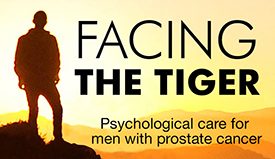
Prostate Cancer is now the most common cancer in Australia, overtaking breast cancer as the country’s leading cause of cancer. Data just released by the Australian Institute of Health and Welfare estimates 24,217 Australian men will be diagnosed with prostate cancer this year, compared to 20,640 women diagnosed with breast cancer. The forecast is a 34 per cent increase on previous year.
That’s a serious assault on mens health – and their mental health in particular. So let’s start doing something about it in urology practices and cancer treatment centres right now for a cost of around just $20 per patient!
Stay with me here. Let’s follow the logic.
A prostate cancer diagnosis is almost always accompanied by feelings of fear, shock, anger, deep sadness and confusion. Why? Because it’s what psychologists call ’a major life stress’ — an event that causes a threat to the things that matter to us most. This level of stress can cause serious harm. The emotional turmoil can compromise a man’s physical health, decision-making, communication with health professionals, and ability to effectively use patient support networks. Side effects from certain prostate cancer treatments compound the distress with impacts on cognitive capacity, feelings of self-worth, and personal resilience. This distress radiates out, affecting partners, families, colleagues.
Yet the level of patient distress is often hidden from healthcare providers. Asking for psychological help does not come naturally to many men. Research has even shown that men who say to their doctor they will take action in the face of dealing with prostate cancer are actually those who are least likely to seek help. So why do we persist in waiting for men with prostate cancer to tell us they need psychological help? And how do we begin to give that help without a huge financial investment in psychologists?
We start by making proper use of a well-established, evidence-based resource from Australia’s own world leader in the psychology of prostate cancer, Professor Suzanne Chambers AO. Facing the Tiger is not a book about treatment options, cancer, anatomy, or disease. It does not give any medical advice. It is a low-level psychological intervention capable of ameliorating psychological distress around a prostate cancer diagnosis and throughout a man’s treatment journey. The book provides psychological information and guidance for a man and their partner, allowing them to find their own unique path to a sense of ease and coping. Providing as many prostate cancer patients as possible with a copy of Facing the Tiger for around $20 each forms the first part of a tiered care approach capable of having a major impact on the mental health and wellbeing of the more than 200,000 men living in Australia with prostate cancer. It’s an approach that’s already familiar to around 100 trained specialist prostate cancer nurses across Australia.
It’s something we can and should do RIGHT NOW. See – How it works.
- Stephen May
